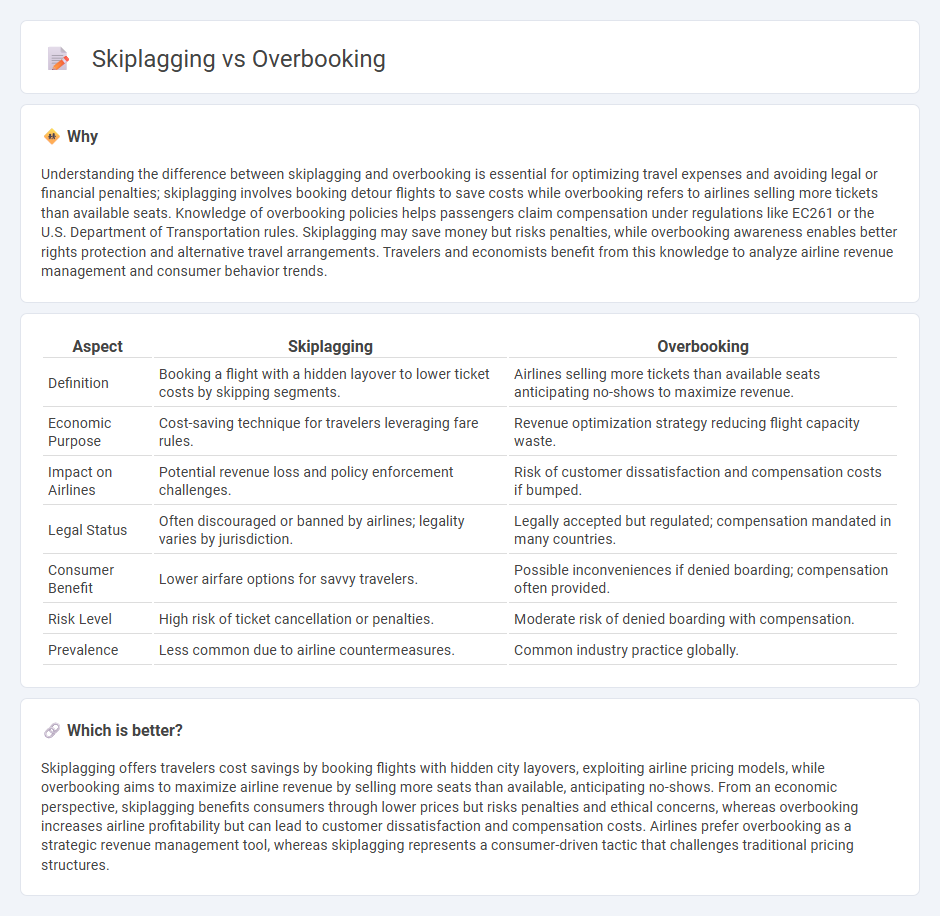
Skiplagging exploits hidden city ticketing by booking flights with layovers but intentionally missing the final leg to save costs, while overbooking involves airlines selling more tickets than available seats to maximize revenue despite potential denied boarding. Both practices impact airline economics and passenger experience differently, influencing pricing strategies and risk management. Explore the implications of skiplagging and overbooking to understand their effects on modern airline economics.
Why it is important
Understanding the difference between skiplagging and overbooking is essential for optimizing travel expenses and avoiding legal or financial penalties; skiplagging involves booking detour flights to save costs while overbooking refers to airlines selling more tickets than available seats. Knowledge of overbooking policies helps passengers claim compensation under regulations like EC261 or the U.S. Department of Transportation rules. Skiplagging may save money but risks penalties, while overbooking awareness enables better rights protection and alternative travel arrangements. Travelers and economists benefit from this knowledge to analyze airline revenue management and consumer behavior trends.
Comparison Table
| Aspect | Skiplagging | Overbooking |
|---|---|---|
| Definition | Booking a flight with a hidden layover to lower ticket costs by skipping segments. | Airlines selling more tickets than available seats anticipating no-shows to maximize revenue. |
| Economic Purpose | Cost-saving technique for travelers leveraging fare rules. | Revenue optimization strategy reducing flight capacity waste. |
| Impact on Airlines | Potential revenue loss and policy enforcement challenges. | Risk of customer dissatisfaction and compensation costs if bumped. |
| Legal Status | Often discouraged or banned by airlines; legality varies by jurisdiction. | Legally accepted but regulated; compensation mandated in many countries. |
| Consumer Benefit | Lower airfare options for savvy travelers. | Possible inconveniences if denied boarding; compensation often provided. |
| Risk Level | High risk of ticket cancellation or penalties. | Moderate risk of denied boarding with compensation. |
| Prevalence | Less common due to airline countermeasures. | Common industry practice globally. |
Which is better?
Skiplagging offers travelers cost savings by booking flights with hidden city layovers, exploiting airline pricing models, while overbooking aims to maximize airline revenue by selling more seats than available, anticipating no-shows. From an economic perspective, skiplagging benefits consumers through lower prices but risks penalties and ethical concerns, whereas overbooking increases airline profitability but can lead to customer dissatisfaction and compensation costs. Airlines prefer overbooking as a strategic revenue management tool, whereas skiplagging represents a consumer-driven tactic that challenges traditional pricing structures.
Connection
Skiplagging and overbooking are linked through airlines' strategies to maximize revenue and optimize seat occupancy. Skiplagging exploits hidden city ticketing, where passengers book cheaper connecting flights but disembark early, impacting airlines' revenue management and flight capacity predictions. Overbooking aims to counteract no-shows by selling more tickets than seats, yet skiplagging disrupts this balance, leading to revenue losses and operational challenges in the aviation economy.
Key Terms
Revenue Management
Overbooking maximizes airline revenue by selling more seats than available, relying on statistical models to predict no-shows and minimize losses from denied boardings. Skiplagging, or hidden city ticketing, exploits fare disparities by booking flights with layovers at a cheaper total cost, challenging traditional pricing and revenue management strategies. Explore how airlines adapt their revenue management systems to balance profitability and customer experience amid these practices.
Yield Optimization
Overbooking maximizes airline revenue by selling more seats than available, relying on statistical models to predict no-shows and cancellations, thus improving yield optimization through higher load factors. Skiplagging, or hidden-city ticketing, exploits fare disparities by booking flights with layovers and exiting before the final destination, which can undermine revenue management strategies. Explore deeper insights into these practices and their impact on airline profitability and customer experience.
Fare Structures
Overbooking involves airlines selling more tickets than available seats to maximize revenue, often based on advanced revenue management algorithms predicting no-shows. Skiplagging exploits fare structures by booking flights with layovers, intentionally missing the final leg to access cheaper fares due to market inefficiencies in price segmentation. Explore detailed fare dynamics and airline policies to understand the financial implications and legal considerations of both strategies.
Source and External Links
overbooking | Wex | US Law | LII / Legal Information Institute - Overbooking is the intentional acceptance of more reservations than capacity, commonly used by airlines and hotels to minimize waste and maximize occupancy, with legal limits and compensations for denied boarding passengers.
Overbooking - AltexSoft - Overbooking in travel means selling more tickets or rooms than available based on statistical predictions of no-shows, used to optimize revenue but requiring management plans for customer dissatisfaction when all show up.
Overselling - Wikipedia - Overselling or overbooking is selling more of a product or service than supply, a common business strategy particularly in travel to ensure maximum resource use, often regulated and requiring compensation if service is denied to customers.
 dowidth.com
dowidth.com